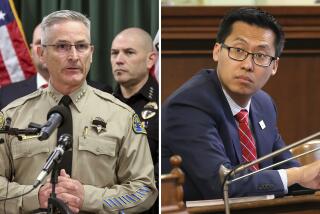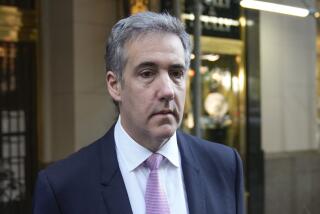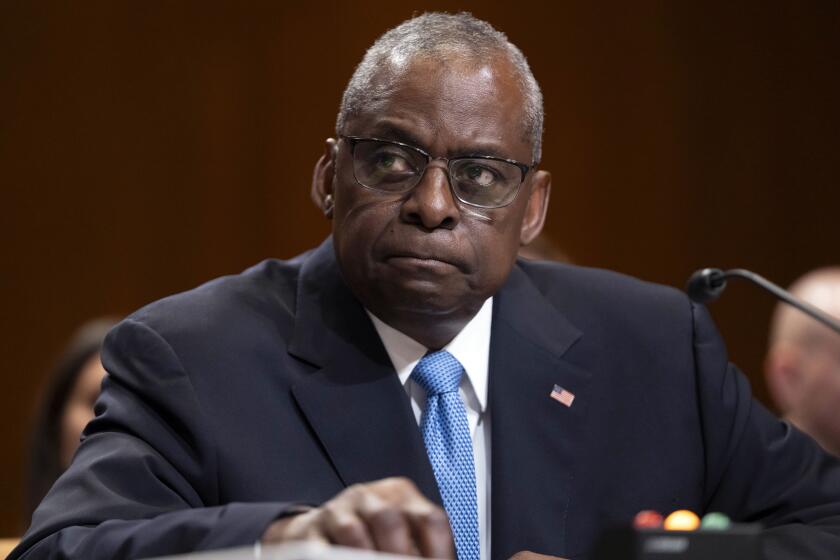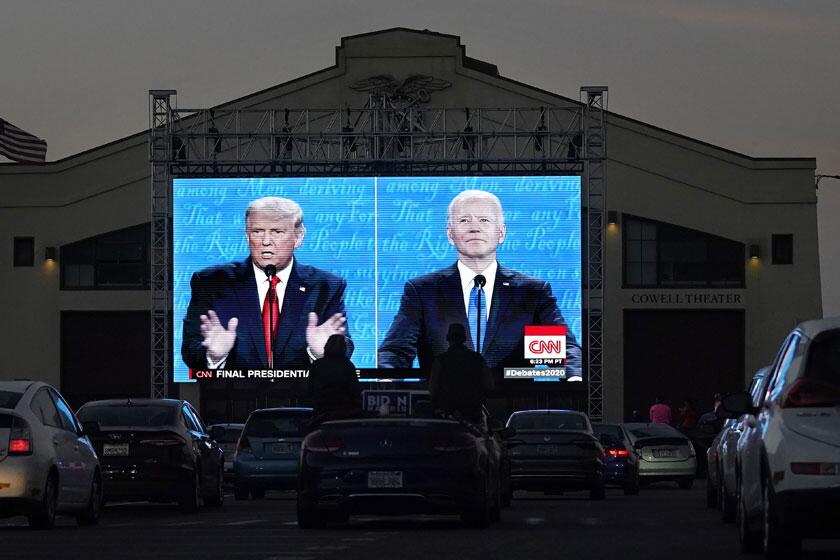Brown’s Judicial Picks Often Contributors Too : Politics: Most insist there was no link to donations. But some appointees say the rules of the game were clear.
From 1978 to 1980, lawyer Richard F. Charvat and his parents donated $5,750 to the campaign coffers of Edmund G. (Jerry) Brown Jr., then governor of California. The elder Charvat says he wanted to obtain a judicial appointment for his son. On Oct. 5, 1981, it came through: Brown named Richard Charvat to the Los Angeles Municipal Court bench.
In 1979 and 1980, Michael Scott Luros and his parents contributed $2,066 to Brown. The next year, the family threw a fund-raising reception for Brown at their Northridge home and also contributed another $5,000. In April, 1981, Luros was named a judge on the Los Angeles Municipal Court.
Likewise, lawyer Robert Letteau contributed $5,500 to Brown and a prominent member of his law firm kicked in another $13,480. In 1982, he assumed his new position as a judge on the Los Angeles Superior Court.
Today, as he runs for President, Brown has billed his campaign as a crusade against what he calls the corrupting influence of big contributions on American politics. He has made a point of rejecting any donations over $100, and has repeatedly criticized Arkansas Gov. Bill Clinton, his opponent for the Democratic nomination, for soliciting large contributions from wealthy people he says are trying to buy influence.
Big-donor politics is “a cancer eating away at the heart of this party and the heart of this country,” Brown declared at a recent fund-raising banquet. The nation, he said in a debate last week, must “throw aside this rotten system where thousand-dollar donors and gigantic contributors and special interests have our country in a gridlock.”
But a Times analysis of public records in Washington and Sacramento shows that during Brown’s later years as governor of California, there was a striking correlation between campaign gifts he received and one of the most important responsibilities of his office: the appointment of judges.
Between 1979 and 1983, the records show, 118 men and women who contributed to Brown’s campaigns for governor, President or the Senate received appointments to the bench. They made up about a fifth of his judicial nominations during this period.
Forty-two made gifts of $700 or more. In some cases, the contribution was made a few days before the nomination was announced. In all, people who sought judicial appointments or had gotten them provided at least $122,941 to Brown for his last three races.
Brown, his advisers and friends say there was no link between donations and judicial nominations. In an interview, Brown denied that his campaign fund-raisers engaged in any improper activity. If any such activity had come to his attention, he said, he would have told them: “Knock it off. You don’t need to do that. It’s not appropriate.” He added that he appointed “thousands of people” who did not contribute to his campaigns.
Lawyers and Vacuums
At the same time, he acknowledged that his campaigns were constantly holding fund-raising parties and prominent lawyers were usually invited to attend them. He said he accepted money from anyone, as long as they were not involved in criminal activity.
“I can tell you this, there were lots of lawyers involved in my campaigns, a lot more than doctors,” said Brown, who is a lawyer himself. “. . . Most (lawyers) who get involved in politics have to go past the State Bar and those lawyers at some point want to become judges. They become judges by getting to know the governor. That’s the way the process works.”
Likewise, he said, he was always involved in a ceaseless quest for money.
“Look,” he said, “the fund-raising machine operated like a vacuum cleaner. Telephone, letters, beating the bushes. People weren’t excluded unless they acted improperly, were involved in some illegal activity or requested some kind of explicit favor.”
Similarly, most of Brown’s judicial appointees contacted by The Times insisted that they were not required to contribute for their appointment. “There was absolutely no connection of any sort,” said J. Michael Beecher, a $7,000 contributor who was appointed to the West Orange Municipal Court in 1982. “That general line is off the wall. There’s nothing to it.”
Letteau added: “I just don’t think you can buy a judgeship.”
But some Brown appointees and former insiders recalled that California attorneys seeking judicial appointments during Brown’s final term in Sacramento were sometimes asked to make contributions to his campaigns and attend fund-raising events for the governor.
Charvat and his father said they understood that they had to contribute to Brown to get a judicial appointment.
“I felt I had to go to those dinners in order to become a judge when I was asked to attend,” Charvat said in an interview. His father, a former law partner of Brown’s father, former Gov. Edmund G. (Pat) Brown, added: “My son was a lawyer . . . and I wanted him to be a judge. I made those contributions in the hope he would appoint my son, and he did.”
Brown was governor from 1975 to 1983. During his first term, according to several former aides, his campaign apparatus made little effort to solicit contributions from potential judicial appointees. He had campaigned as a reformer in the wake of public disgust over the Watergate scandal, and, seeking to include minorities of every sort in a culturally diverse Administration, he named more women, blacks and Latinos to judgeships than any governor before him.
But, the former aides said, while he was running for President in 1980, his campaign began to turn more frequently to potential appointees as a source of funds, particularly when he found himself unable to raise money elsewhere before the crucial New Hampshire primary. He finished third in New Hampshire with 10% of the vote.
As the campaign strained for funds, “the word was out,” said one former Brown confidant. Those willing to help could “at least move to the head of the line.”
This is not the first time that Brown has been accused of soliciting prospective appointees for money. When Brown and current Gov. Pete Wilson were vying for the Senate in 1982, Wilson frequently accused him of pressuring judicial appointees to contribute.
Nor is it unusual for politicians to reward political backers and other loyalists with coveted, long-term appointments. In Arkansas, Clinton has been known to reward political allies with judgeships, although he has never been accused of pressuring them for contributions.
“Candidates raise money from people who want something,” said Robert M. Stern, co-director of the California Commission on Campaign Financing. “People don’t give for charity; they give for a reason.”
Still, the suggestion of directly linking judgeships--positions of far-reaching power with the highest standards for fairness, impartiality and honesty--to political donations is viewed as especially sensitive.
“I think it’s particularly unseemly with the judiciary,” said Larry Sabato, an expert on campaign finance at the University of Virginia. “Most people hope the judiciary is independent of crass politics. When you find money affecting judicial appointments, it sends a shiver down your spine.”
Although judgeships are elective offices in California, as in many other states, the state’s chief executive has the authority to make interim appointments when a seat becomes vacant. He also can fill newly created positions. Brown, like his predecessors, wound up getting about 125 such opportunities a year.
The appointees have to stand for election when the term they are filling expires, but holding the office gives them a big advantage with the voters.
Brown said judges were selected on the basis of three criteria: “Legal competence, based on criteria by the State Bar; diversity, to reflect the character of California in terms of philosophy, ethnicity and gender; and community service.” He said he was never aware of the names of people who had applied for judgeships until they were proposed to him.
He suggested that Mickey Kantor, now Clinton’s campaign chairman, would have been aware of any impropriety since Kantor served in various high-ranking jobs in Brown’s presidential and Senate campaigns in the past.
But Kantor said he had “no personal knowledge” of any such activity. “I never was involved in raising money for Jerry Brown,” Kantor said. Asked if he had ever heard about fund raising among judicial candidates, he replied: “You hear a lot of things. I don’t want to comment on it. That would be unfair.”
Push for Diversity
Byron Georgiou, who served as the governor’s legal appointments secretary during Brown’s second term, explained that California lawyers aspiring to be judges were able to make application to the governor’s office. When a vacancy came up in their region, they were among those considered. All potential appointees also were reviewed by both a local and a state committee of the State Bar of California.
Georgiou, who succeeded J. Anthony Kline as Brown’s legal affairs secretary in 1980, said neither he nor Kline knew who was contributing to the governor’s campaigns at the time they were reviewing prospective nominees. He said the final selections were based entirely on merit and recommendations.
Brown was attracted to some because they were activists in groups representing women or minorities. Others were elevated because they had strong backing from influential patrons.
Said Georgiou of Brown: “He didn’t have the foggiest idea who gave to any of his campaigns.”
But several aides who worked in the governor’s office at the time said some fund-raising staff members tried to influence appointments and stimulate contributions. Some said they believed that Brown himself was unaware of these activities.
“Unbeknownst to the governor,” said B. T. Collins, a state assemblyman and former Brown chief of staff, the “political types were scouring the political hillside for contributions. It’s the old story of an overzealous campaign staff.”
Jodie Evans, now Brown’s presidential campaign manager, was then the chief political fund-raiser on his staff. She could not be reached immediately for comment.
Brown’s need for campaign contributions became critical during early 1980, when his second bid for the presidency was foundering and lacking cash. Collins said Brown’s fund-raisers found it difficult to raise enough money under federal laws that prevented primary contributors from giving more than $1,000 each.
According to records, Brown’s campaign reported having less than $73,000 in the bank at the beginning of January, 1980, with the New Hampshire primary ahead. Although Brown spent $3.2 million during his campaign, he won only one delegate from Wisconsin.
It was during early 1980 that Brown’s operatives decided to seek donations from potential judicial appointees, sources said. Afterward, they said, soliciting donations from prospective appointees became a frequent technique and reached its peak during the 1982 Senate race.
Some judicial appointees who contributed to Brown’s campaigns said that after they became candidates for the job, they were soon invited to fund-raising events for the governor.
“In order to become a judge, you submit an application,” explained Charvat, recalling the process by which he was selected. “If approved, you go on an approved list and you can be appointed at any time. Then what happens is you are given invitations to go to these dinners. . . . It’s an opportunity to meet the governor, and then he knows you.”
Charvat, a registered Republican who was later elevated from Municipal Court to Superior Court by Gov. George Deukmejian without making a contribution, said it was Brown’s father who contacted him, saying: “Dick, I want you to meet Jerry next Saturday. I want you to be at a (fund-raising) dinner at the Century Plaza.”’
No one ever explicitly told Charvat that an appointment to a municipal court judgeship would follow his contribution, but it was implied, according to his father, Frank. “It was not quite that raw,” he said.
None of the judges contacted by The Times reported being invited to a fund-raising event or solicited for a contribution by Brown himself. Among judges who acknowledged being approached, most said the appeal came from people closely associated with the governor, usually someone without any official position.
John Shook said he was first contacted by a law client who was close to Brown and who later recommended him to the governor for a judgeship. He and his wife contributed $3,350 between 1979 and 1981. He was appointed to the Compton Municipal Court in January, 1983.
“My client called me and said, ‘Look, buddy boy, we spent money on your candy shop,’ and (he) had a fund-raiser in Brentwood, and he wanted me to make a contribution to the governor,” said Shook. Like Charvat, he was later elevated to Superior Court by Deukmejian without contributing.
Phillip J. Argento, a Municipal Court judge in Pasadena, gave a slightly different account of his experience. He said he made a few, small contributions to Brown before his appointment in February, 1982, but decided to contribute $800 afterward. He said there was no implied trade-off, but he discussed contributions with Brown’s campaign aides both before and after his appointment.
“There came a time, after my name went out for nomination (to the State Bar reviewing committee) that I got a call from the campaign saying they would not accept any donations from me because I was up for nomination,” he said. After his appointment, “we got a call from the campaign saying it was OK to contribute again.”
Another Brown judicial appointee, who asked not to be identified, said he believes he lost a promotion to a higher court because he declined to host a fund-raising reception for Brown when he was asked to do so. “Some local lawyers offered to do a fund-raiser for the governor (to boost his career),” he said. “I didn’t think I needed it. I was naive at the time.”
Normally aloof from the process, Brown himself may have been more involved in the appointment of Luros, whose father, Milton Luros, was a convicted pornographer. Because of the family’s controversial background, “the governor knew the details of that one, I’m pretty sure,” said Collins, the former chief of staff. He said Georgiou pressed for Luros, using the argument, “Don’t visit the sins of the father on the son.”
At the time, the Luros appointment made headlines because Brown was photographed emerging from a reception at the family home in Northridge. The photo appeared in the Los Angeles Daily News under the headline: “One-Time Porn Distributor Hosts Gov. Brown Fund-Raiser.”
In response to the publicity, Brown returned $3,800 to the Luros family.
Brown indicated Luros had been an active volunteer in his campaign. “He was always there,” he said, referring to Michael Luros. “He showed up at the office. He was bringing in sandwiches, cookies, trying to be as helpful as he could. He won the hearts and souls . . . of the people who worked in the campaign.”
Luros and his parents declined to be interviewed, but his brother, Richard, a physician, insisted there was no connection between the contributions and the appointment.
Most Deny Link
Of the more than 30 judges appointed by Brown who were interviewed for this story, the vast majority said their contributions had no connection to their appointments to the bench.
“To think there could be any connection between a contribution and an appointment is the most ridiculous statement I’ve ever heard,” said retired Judge Robert D. Fratianne. “It’s even defamatory and slanderous. Seriously, I take it as an affront.”
James A. McKechnie, another retired jurist, said: “If everyone who gave $500 to Jerry Brown had been appointed a judge, he would have appointed 10,000 judges. I never knew a judge who got appointed that way.”
“I find the idea shocking,” said Kline, Brown’s former legal secretary who now presides over the 1st District Court of Appeal. “I’ve never heard that suggested. There is absolutely nothing to it.”
Kline, who has known Brown since they studied together at Yale Law School, said that Brown set out to reshape the judiciary, using his appointment power to reflect the population of the state, which was “rapidly becoming the most ethnically and racially diverse in the country.”
Often, that aim ran afoul of the traditional idea of appointing judges based on political clout and legal philosophy and caused grumbling, Kline said.
Both Kline and Collins recalled that Brown always reacted in horror whenever anyone blatantly tried to use money to influence his choices on any matter. As Collins put it: “That was the kiss of death.”
Many judges who denied using contributions to obtain their appointments did acknowledge that the choices were often based on politics as well as merit.
Letteau said his name was brought to the attention of Brown by his law partner, David C. Pierson, a former Democratic assemblyman from Inglewood who had been friends with the governor for many years. Pierson, who contributed $13,460 to Brown between 1979 and 1980, hosted a fund-raising event for Brown in 1979, attended by Letteau and his wife.
Not All Appointed
“I think it would be foolish for me to suggest that the governor ever would have known of my interest in a judgeship if it had not been for that relationship,” he said. “ . . . If your best friend, if your business partner or associate is hosting a fund-raising event, whether it’s your political party or not, you’d probably be there.”
Many judges asserted that Brown was not the only recipient of their political contributions at the time. “I was very active politically, so it was not unusual for me to make a contribution to candidates,” explained Judge Roy Benjamin Cazares of the South Bay Municipal Court.
Perhaps the most persuasive Brown defenders were those who made contributions, sought a judicial appointment and failed to get one. Among them is Mary Nichols, a Los Angeles environmental lawyer and one of many officials in the Brown Administration who sought judicial appointments shortly before the governor left office in January, 1983.
Nichols, who said she was never encouraged to contribute to Brown’s campaign, dismissed the recurring rumors that contributions were sometimes necessary to get a judicial appointment. “I have always believed that those stories were spread by people who didn’t get appointed,” she said.
This story was reported by Times staff writers Sara Fritz, Dwight Morris and Paul Jacobs, and written by Fritz.
Contributing to this story were staff writers Virginia Ellis, Jeff Perlman and George Skelton and researchers Murielle Gamache, Doug Conner and Nina Green.
Brown’s Judicial Contributors
A review of federal and state records shows that Edmund G. (Jerry) Brown Jr., while serving as governor of California, received sizable campaign contributions from at least 42 judicial appointees, their spouses or other family members. In the following summary, boldfaced dollar amounts represent the sum of several individual contributions.
Date KEY CONTRIBUTIONS Judge Appointed Date Amount Michael S. Luros 4/06/81 1980 *$1,600 Municipal Court 1/07/81 150 Los Angeles 1/25/81 316 6/30/81 *5,000 J. Michael Beecher 2/3/82 1978-80 5,125 Municipal Court 4/16/81 1,000 West Orange 7/18/81 900 Richard F. Charvat 10/5/81 1978 2,000 Municipal Court 1979 *3,250 Los Angeles 1980 * 500 Robert Letteau 1/20/82 6/15/79 3,500 Superior Court 6/17/81 2,000 Los Angeles Lorenzo Patino 4/18/80 1978 4,845 Municipal Court Sacramento Joel Rudof 5/13/81 5/18/81 2,000 Superior Court 5/30/81 *2,000 Los Angeles Leon S. Kaplan 8/21/81 1978-79 2,000 Municipal Court 6/12/81 1,000 Los Angeles 9/19/81 500 John Shook 1/02/83 1979-81 *3,350 Municipal Court Compton Sheila Prell 5/18/81 1980-81 1,100 Sonenshine Superior Court Orange Court of Appeal 11/29/82 5/07/82 *2,000 4th District Kenneth Byung-Cho 4/21/81 4/23/81 2,000 Chang Superior Court 1980 950 Los Angeles Michael Pirosh 5/13/81 1980 * 700 Municipal Court 5/18/81 *2,000 Los Angeles Superior Court 11/08/82 Los Angeles Edward I. Gorman 10/16/80 9/26/79 *2,000 Municipal Court Los Angeles Superior Court 6/12/81 10/29/80 500 Los Angeles Maxine K. M. Chesney 4/05/79 10/21/78 * 400 Municipal Court 9/21/79 *1,000 San Francisco 4/21/81 *1,000 Superior Court 1/01/83 San Francisco Coleman Blease 5/14/79 1978 2,275 Court of Appeal 3rd District Gerald J. Levie 3/11/80 1979 550 Superior Court 1/18/80 *1,000 Los Angeles 1/27/80 450 Michael L. McInnis 3/14/79 5/02/78 200 Superior Court 10/13/78 1,500 Solano 5/04/79 100 Thomas C. Hastings 2/11/80 1978 150 Superior Court 1979 1,250 Santa Clara 1980-81 350 Roy Benjamin Cazares 5/11/82 10/25/78 500 Municipal Court 09/29/79 1,000 San Diego Henry P. Nelson 3/11/80 1978-80 1,500 Superior Court Los Angeles Barbara Gamer 7/16/80 1978-81 *1,475 Municipal Court San Diego Superior Court 1/01/83 San Diego Virginia Mae Days 3/28/81 1978-80 1,297 Municipal Court Santa Clara James McKechnie 12/05/78 1978 1,043 Municipal Court Whittier Richard Berry 6/15/81 5/18/81 1,000 Municipal Court Los Angeles William C. Beverly Jr. 5/28/80 1/16/80 1,000 Municipal Court Long Beach David I. Doi 1/02/83 1982 *1,000 Municipal Court Los Angeles Robert Feinerman 4/20/82 5/18/81 *1,000 Court of Appeal 2nd District Roy S. Ferkich 3/10/81 11/01/82 *1,000 Municipal Court Los Angeles Madeleine I. Flier 7/01/80 1/17/80 *1,000 Superior Court Los Angeles Rodney G. Forneret 12/14/81 4/24/81 1,000 Municipal Court Inglewood Melvin B. Grover 1/02/83 11/06/79 1,000 Superior Court Los Angeles Eugene T. Gualco 1/10/79 10/29/78 1,000 Superior Court Sacramento Edward L. Merrill 12/21/82 10/21/81 1,000 Superior Court Contra Costa Michael E. Pastor 1/02/83 5/18/81 1,000 Municipal Court Los Angeles Mark P. Robinson Sr. 1/02/83 12/16/81 *1,000 Superior Court Orange Veronica Simmons 7/23/81 6/30/81 1,000 Municipal Court Los Angeles Jack Tenner 3/19/80 1978-79 550 Superior Court 3/01/80 450 Los Angeles Ferdinand Fernandez 5/08/80 4/05/80 500 Superior Court 8/18/80 200 San Bernardino 11/13/80 200 Phillip J. Argento 2/10/82 11/1/82 * 800 Municipal Court Pasadena Norman W. Gordon 1/01/83 5/13/82 800 Superior Court Los Angeles Robert Fratianne 10/17/78 ‘78-’80 725 Municipal Court Los Angeles Superior Court 4/06/81 Los Angeles Mary Morgan 8/26/81 5/18/81 725 Municipal Court San Francisco Jerome K. Fields 3/11/80 12/16/79 200 Superior Court 12/19/79 200 Los Angeles 3/01/80 300
* Includes one or more donations by spouse or family member
More to Read
Get the L.A. Times Politics newsletter
Deeply reported insights into legislation, politics and policy from Sacramento, Washington and beyond. In your inbox three times per week.
You may occasionally receive promotional content from the Los Angeles Times.






